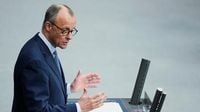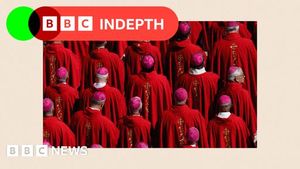In a surprising turn of events in German politics, Friedrich Merz, the leader of the Christian Democratic Union (CDU) and designated Chancellor, has appointed Karsten Wildberger as the first Federal Minister for Digitalization and State Modernization. Wildberger, who previously served as the CEO of the MediaMarkt/Saturn Group, is set to bring his extensive managerial experience to a newly created ministry focused on enhancing Germany's digital capabilities.
At 56 years old, Wildberger holds a doctorate in physics and has a rich background in the telecommunications and energy sectors. He has held leadership positions at T-Mobile, Vodafone, and E.ON, where he was instrumental in overseeing digital transformation efforts. His appointment comes at a critical time as the German government seeks to modernize its digital infrastructure and improve administrative efficiency.
Wildberger's track record is impressive. Currently responsible for about 1,000 Media Markt and Saturn stores across Europe, including 400 in Germany, he has been a prominent figure in the retail industry. His innovative ideas, such as advocating for the sale of electric cars in Media Markt stores and proposing Sunday openings for retail sales to compete with online shopping, have made headlines in the past.
In his own words, Wildberger expressed gratitude for the trust placed in him by Merz, stating, "I feel honored by the trust that Friedrich Merz has in me and the opportunity to become the new Minister for Digital Affairs. Digitalization and technology have been defining themes of my career, and this new ministry will play a crucial role in modernizing our country." His vision for the ministry includes uniting a team behind a coherent strategy aimed at achieving technological sovereignty with a European focus.
The establishment of the Digital Ministry has been a long-discussed topic in Germany, with 71 percent of the population supporting its creation, according to a Bitkom survey. The need for a dedicated ministerial role became increasingly evident as digital issues permeated various sectors, prompting calls for a centralized approach to digital governance.
Prior to Wildberger's appointment, discussions about potential candidates for the Digital Ministry often featured women from diverse backgrounds. Notable figures such as Verena Pausder, a prominent advocate for startup culture, and Judith Gerlach, the former Digital Minister of Bavaria, were considered. However, Merz ultimately chose Wildberger, fulfilling his promise to bring in an outsider to lead the ministry.
Wildberger's responsibilities will include consolidating digital policy competencies that were previously scattered across various ministries. This shift aims to streamline efforts and enhance the effectiveness of Germany's digital initiatives. The new ministry will focus on administrative digitization and modernization, with a strong emphasis on user-friendliness and efficiency.
Critics of the ministry's establishment have raised concerns about the associated costs and the perception that digitalization should be an integral part of all governmental functions. However, supporters argue that a dedicated ministry is essential for addressing the unique challenges posed by rapid technological advancements.
In addition to Wildberger's appointment, Merz's cabinet will also include Patrick Schnieder as the Minister of Transport, Nina Warken as the Minister of Health, and Katherina Reiche as the Minister of Economic Affairs. These appointments reflect Merz's commitment to assembling a diverse team capable of tackling the pressing issues facing Germany.
As the new Digital Minister, Wildberger faces the daunting task of leading Germany into a more digitally advanced era. His experience in managing large-scale operations and navigating complex organizational challenges will be crucial as he seeks to implement effective strategies for digital transformation.
With Merz set to be elected Chancellor on May 6, 2025, all eyes will be on how Wildberger and the new ministry will address the digital needs of the nation. The establishment of the Digital Ministry marks a significant step in recognizing the importance of digitalization in modern governance and the necessity of having dedicated leadership in this critical area.
As Germany prepares for this new chapter, the success of Wildberger's initiatives will likely depend on his ability to collaborate with various stakeholders, including businesses, government agencies, and the public. The stakes are high, and the potential for innovation and growth in the digital sector is immense.
In summary, Karsten Wildberger's appointment as the first Federal Digital Minister signifies a pivotal moment in German politics, reflecting a growing recognition of the importance of digitalization in governance. His background and vision offer hope for a more connected and efficient future for Germany.






